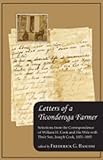Letters of a Ticonderoga Farmer : Selections from the Correspondence of William H. Cook and His Wife with Their Son, Joseph Cook, 1851–1885 / ed. by Frederick G. Bascom.
Material type: TextPublisher: Ithaca, NY : Cornell University Press, [2018]Copyright date: ©2010Description: 1 online resource (148 p.)Content type:
TextPublisher: Ithaca, NY : Cornell University Press, [2018]Copyright date: ©2010Description: 1 online resource (148 p.)Content type: - 9781501723513
- 974.7/04092 23
- online - DeGruyter
| Item type | Current library | Call number | URL | Status | Notes | Barcode | |
|---|---|---|---|---|---|---|---|
 eBook
eBook
|
Biblioteca "Angelicum" Pont. Univ. S.Tommaso d'Aquino Nuvola online | online - DeGruyter (Browse shelf(Opens below)) | Online access | Not for loan (Accesso limitato) | Accesso per gli utenti autorizzati / Access for authorized users | (dgr)9781501723513 |
Browsing Biblioteca "Angelicum" Pont. Univ. S.Tommaso d'Aquino shelves, Shelving location: Nuvola online Close shelf browser (Hides shelf browser)

|

|

|

|

|

|

|
||
| online - DeGruyter Light without Heat : The Observational Mood from Bacon to Milton / | online - DeGruyter Battling the Buddha of Love : A Cultural Biography of the Greatest Statue Never Built / | online - DeGruyter The "Odyssey" in Athens : Myths of Cultural Origins / | online - DeGruyter Letters of a Ticonderoga Farmer : Selections from the Correspondence of William H. Cook and His Wife with Their Son, Joseph Cook, 1851–1885 / | online - DeGruyter Soul, Body, and Survival : Essays on the Metaphysics of Human Persons / | online - DeGruyter Race, Racism, and Reparations / | online - DeGruyter For the Common Good : Popular Politics in Barcelona, 1580–1640 / |
Frontmatter -- Contents -- Introduction -- CHAPTER I. As the Twig Is Bent -- CHAPTER II. Andover in the Fifties -- CHAPTER III. Yale in the Fifties -- CHAPTER IV. War Times -- CHAPTER V. Adirondack Murray -- CHAPTER VI. On the Downward Slope -- CHAPTER VII. The Monday Lecturer -- CHAPTER VIII. The Rising and the Setting Sun
restricted access online access with authorization star
http://purl.org/coar/access_right/c_16ec
William H. Cook, of the village of Ticonderoga, exemplified the strong, high-minded farmer of the nineteenth century. Devoted to his only son, Joseph, William's one consuming desire was to see that this boy should have an education with the best. Although it meant years of financial sacrifices for the old farmer, Joseph was sent to the finest schools: Phillips Andover, Yale, Harvard, and universities in Germany. After twenty years of education, Joseph became famous as the "Boston Monday Lecturer," whose talks on subjects ranging from theology and science to current events and world history attracted thousands of listeners every week and were reprinted in newspapers around the world. His lecture tours took him around the world and his books became bestsellers in their day. After leaving home at the age of thirteen, Joseph only returned to Ticonderoga infrequently. But father and son kept in close touch by letter over a thirty-year period. In Letters of a Ticonderoga Farmer (first published by Cornell in 1946), Frederick G. Bascom has made selections from their correspondence between 1851 and 1885, which together present a delightful running narrative of both William's day-to-day life in nineteenth-century upstate New York, revealing a shrewd yet generous nature and a homely genius, and Joseph's experiences in higher education and as a celebrity. Letters from Joseph's mother to her son, though fewer in number, round out the portrait of both farm and family life in this period. Introduced and lightly annotated by Bascom, these letters continue to offer useful and charming insights into the social history of upstate New York, from economic and industrial developments to local politics and religious controversies, as well as offering much human interest and considerable local color.
Mode of access: Internet via World Wide Web.
In English.
Description based on online resource; title from PDF title page (publisher's Web site, viewed 26. Apr 2024)


